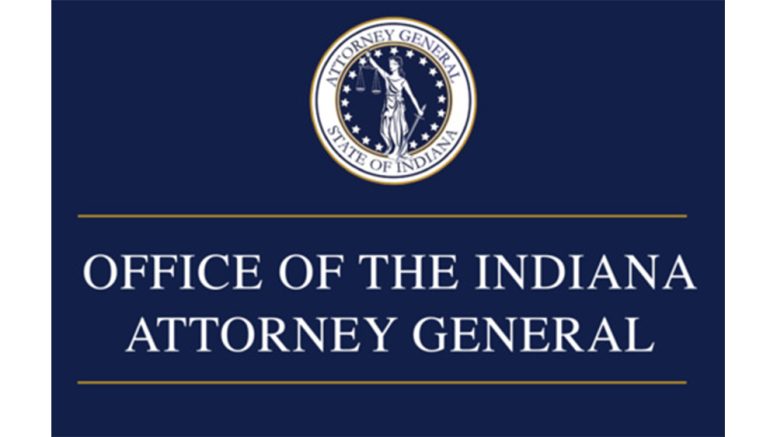Reporter exclusive provides balance to portal debate
The Eyes On Education portal on the Indiana Attorney General’s (AG’s) website went live Feb. 6 and has already become a highly divisive topic.
You’ve probably read any number of articles and Op/Eds speaking out against it in other publications. This newspaper has not found any sources focusing on the AG’s side of this issue, so in the interest of providing fair and balanced news, we sat down with AG Todd Rokita to hear his side of the story and thus return a little balance to media coverage.

Rokita
“I go to almost every county every year,” Rokita told The Reporter. “I drive over 50,000 miles a year without leaving the state lines, and people come up to you with all kinds of things. But after a while, you start seeing patterns. A huge, repeating complaint was, ‘Hey, this is being taught in my kids’ classroom or my grandkids’ classroom.’”
Rokita said he has been collecting submissions for what became the Eyes On Education portal for a long time and, contrary to what is being reported in other media, he told The Reporter the submissions are coming from teachers.
“These same kinds of complaints were the impetus for the Parents’ Bill of Rights, now in its fourth volume,” Rokita said. “The portal now is a tool that attaches to the Parents’ Bill of Rights.”
Rokita said his office reached out to the Department of Education early in the process of composing the Parents’ Bill of Rights.
“They couldn’t have been less interested,” Rokita said. “I offered the complete first volume to them when it was done and – crickets. I said ‘this could be yours if you want it.’ For them to say, ‘oh, well, he didn’t come talk to us’ like I was supposed to – I find it interesting because they couldn’t have been less interested before. And number two, I don’t report to the DOE. I report to your readers.”
Rokita was the K-12 education chairman in the House of Representatives for six years.
“I bring that body of work and experience with me to this job,” Rokita said. “You expect your office holders to bring their personal and professional experiences to the job. So when I see a pattern around the state of, ‘hey, this is a problem,’ and I see no one else doing anything about it – so I did it. I did the Parents’ Bill of Rights, and now we have this follow-on tool in the portal. And again, most of the submissions are from teachers so far.”
Rokita does not have any direct authority over classrooms or education. That is the purview of the Indiana Department of Education. The AG’s office exists in large part to hold other government entities accountable and to protect consumers. Schools are government entities and both teachers and parents are consumers who sometimes need protection.
“They’re trying to be transparent themselves,” Rokita said. “A minority of the submissions currently are from parents saying, ‘Hey, this is what’s going on,’ but mostly teachers. Really, just like the press corps itself, when you do the job honestly, it’s supposed to be to present the facts. Transparency.”
Rokita stressed that the portal is not intended to push a particular political agenda or ideology, but rather to give people a place to report when someone inside the education system is pushing an agenda from either side of the political spectrum.
“If we got some real wild right-wing conspiracy, Nazism, or something crazy like that somehow being taught, and we validated that it was actually a lesson plan or a policy from a school – that’s as far as we validate – we’ll put that on the website, too,” Rokita said. “It goes to the whole spectrum. It’s just that it so happens that a lot of these school districts and teachers who are doing these lesson plans are indoctrinating from the left.”
For those of you interested in doing your own research rather than just reading summaries in this or any other newspaper, you can read the full Parents’ Bill of Rights online at in.gov/attorneygeneral/files/Parents-Bill-of-Rights.pdf.
You can visit the Eyes On Education portal to see the complaints that are lodged (and the instances when schools have changed their policies to remove the policies that initiated those complaints) at in.gov/attorneygeneral/education-liberty.
According to the portal website, “The Office of the Attorney General will follow up on materials submitted to the portal that may violate Indiana law using our investigative tools, including public records requests, and publish findings on the portal as well. Upon submission, someone from our office may contact you for additional information or clarification.”
Rokita said one of the things he discovered is a need for a historical record of the things going on in schools. As an example, he pointed out that when CRT education came into the public eye in 2021, people told Hoosiers, “‘Oh no, that stuff doesn’t happen here. That’s just out in Virginia.’ Now those exact same types of people are saying, ‘oh no, we don’t do that any longer. That’s outdated.’ Well, which is it?” Rokita asked.
AG Rokita told The Reporter he did not expect this portal to be as contentious as it has already become.
“If you’re doing an honest job, if you’re teaching to the standards, and you don’t have some kind of hidden agenda, what do you care that your lesson plans [are made public]?” Rokita said. “Especially if you’re a public school that’s funded by taxpayers and your job is funded by taxpayers, we have no way to keep that stuff secret. And as a government employee – there are complaints, ‘well, you put the teacher’s name up there’ – well, I’m a government employee. My salary is known. But here’s the most interesting thing: I didn’t expect the blowback. And by the way, I don’t care about the blowback. Nothing’s coming down.”
Rokita leaned in close to the Reporter’s microphone and repeated, “Nothing is coming off. Even if it’s an outdated policy – and we’ll post the response from the school – but I think it’s important in terms of transparency to have a historical record. Number one: so bad history doesn’t repeat itself. And number two: so everyone can see what the school is capable of.”
The Reporter does not specifically endorse any elected official, political candidate, or their policies. Our support of the First Amendment’s free speech clause includes both our policy of offering all parties a voice in our pages and also our defense of our right to exclude those who make personal attacks on individuals rather than policies.

